|
|
|
Sort Order |
|
|
|
Items / Page
|
|
|
|
|
|
|
| Srl | Item |
| 1 |
ID:
137551
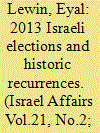

|
|
|
|
|
| Summary/Abstract |
The 2013 election campaign in Israel shows, at first glance, some unanticipated results and unexpected reactions of several political actors. Three events in particular can be noted: (1) the rise of a significant centrist middle-class party; (2) the association of the newly elected right-wing Prime Minister with his left-wing rivals; and (3) the revival of a national religious party after years of decline. A broad overview, however, reveals that from many perspectives numerous key elements of Israeli politics have remained broadly the same over the decades. Some unanticipated outcomes of the elections are to a substantial extent repetitions of past events, referred to in this paper as historic recurrences. In order to establish this claim about historic recurrence, each event is compared to past events with which several striking similarities are found. In order to explain the phenomenon of historic recurrence in Israeli politics, two sets of concepts are applied: the sociological terminology regarding reference group and collective identity, and rational choice theories about voter behaviour and the preferences of political actors.
|
|
|
|
|
|
|
|
|
|
|
|
|
|
|
|
| 2 |
ID:
120793


|
|
|
|
|
| Publication |
2013.
|
| Summary/Abstract |
In May 2009, Taiwan took a significant step in building a modern bureaucracy by passing a statute to create a civil service neutrality system after two decades of democratization. But its agenda for building a civil service neutrality system was not modeled on that of the Western democracies. Taiwan had its own distinct agenda and followed its own path toward civil service neutrality that was adapted to the demands of a polity transformed from a party-state regime. In the case of Taiwan, the neutrality mechanism was governed by the concept of "administrative neutrality" rather than the more common concept of "political neutrality." This paper reviews and makes sense of the evolution of this concept and the neutrality system in Taiwan, and joins the debate of relevance of politics-administration dichotomy.
|
|
|
|
|
|
|
|
|
|
|
|
|
|
|
|
| 3 |
ID:
094979


|
|
|
|
|
| Publication |
2010.
|
| Summary/Abstract |
This article analyses the extent to which national policies in the highly internationalised environmental sector are influenced by the policy preferences of political parties. The focus is on policy outputs rather than environmental performance as the central indicator of policy change. Based on a discussion of the relevant theoretical literature competing hypotheses are presented. For an empirical test, a dataset is used that includes information on the number of environmental policies adopted in 18 OECD countries at four points in time between 1970 and 2000. The results show that not only international integration, economic development and problem pressure, but also aspects of party politics, influence the number of policies adopted. The number of environmental measures increases if the governmental parties adopt more pro-environmentalist policy positions. This effect remains robust even when controlling for the institutional strength of governments, the left-right position of parties in government, the inclusion of an ecological or left-libertarian party inside the (coalition) government, and the presence of a portfolio that deals exclusively with environmental issues.
|
|
|
|
|
|
|
|
|
|
|
|
|
|
|
|
| 4 |
ID:
186563


|
|
|
|
|
| Summary/Abstract |
South Korea's persistent enmity towards its erstwhile colonizer Japan has been a compelling topic of East Asian international relations scholarship for decades. This article argues that the historical evolution of South Korea's democracy offers a vital and overlooked piece of this puzzle. Given that it emerged from one of the most virulently anti-communist dictatorships of the Cold War period, in a society facing an ongoing threat from communist North Korea, any left-of-center opposition movement faced an uphill battle against severe anti-communism. In such circumstances, the only way for a leftist opposition party to survive was by pitting its stronger anti-Japan reputation against conservatives’ anti-communism. After South Korea's democracy stabilized, liberals tried and failed to overturn the anti-leftist institutions left over from the Cold War and then sought equilibrium through parallel rhetoric targeting pro-Japanese elements. Today, neither left nor right can afford to allow a final amicable settlement with its respective target of antagonism. Through analyses of domestic political rhetoric targeting alleged pro-Japanese or pro-communist elements, this paper demonstrates how these competing antagonisms achieved an uneasy equilibrium that undergirds South Korean political dynamics to this day.
|
|
|
|
|
|
|
|
|
|
|
|
|
|
|
|
| 5 |
ID:
144787


|
|
|
|
|
| Summary/Abstract |
We examine whether government ideology was correlated with the growth in military expenditure in Germany over the period 1951–2011. Using various measures of government ideology, the results do not show any effect. The exception is an ideology measure based on the Comparative Manifesto Project (left-right scale): using this measure, the results show that the growth in military expenditure increased by about 2.4 percentage points, when the ideology variable (right-wing) increased by one standard deviation. This effect, however, is based on observations until the early 1960s and cannot be generalized. The major political parties agreed on how to evaluate international risks and threats. Government ideology retired to the background. We conjecture that the consensus among the major parties will persist – even if military spending needs to be increased in response to new international risks and threats.
|
|
|
|
|
|
|
|
|
|
|
|
|
|
|
|
| 6 |
ID:
146860
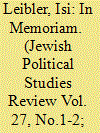

|
|
|
|
|
| Contents |
As we commemorate a year since Yehuda Avner passed away at the age of 86, we honor a noble Israeli who devoted his entire life to serving the Jewish state and the Jewish people. He was my dearest friend with whom I was in almost daily contact over the past decade.
|
|
|
|
|
|
|
|
|
|
|
|
|
|
|
|
| 7 |
ID:
131676


|
|
|
| 8 |
ID:
141820
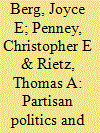

|
|
|
|
|
| Summary/Abstract |
Using the Iowa Electronic Markets (IEM), this article assesses the political impact of several important events during the fall of 2013: the US government shutdown, the Senate elimination of filibusters for presidential nominations (i.e., the “nuclear option”), and the implementation of the Patient Protection and Affordable Care Act (i.e., ObamaCare). Did these events have meaningful effects on congressional control prospects in the 2014 election? According to IEM price changes, Republican chances fell dramatically when the government shut down, and they did not recover on resolution. Eliminating filibusters had a negative impact on Democratic chances. Various aspects of the ObamaCare rollout and reporting, as well as new announcements that incumbents would not run for reelection, had little effect. In contrast, the budget resolution reinforced the status quo. Overall, political rhetoric does not appear to affect congressional control prospects. Instead, actions matter: deliberate partisan actions of Congress adversely affect the initiating party’s prospects, whereas bipartisan initiatives help the party that initiates the bipartisan effort.
|
|
|
|
|
|
|
|
|
|
|
|
|
|
|
|
| 9 |
ID:
153803


|
|
|
| 10 |
ID:
186562


|
|
|
|
|
| Summary/Abstract |
In the last three decades, many Asian democracies have decentralized their political systems to promote the democratic, equal, and efficient distribution of national resources across regions. Nonetheless, most of these countries, including South Korea, are still in a stage of “partial fiscal decentralization,” in which locally elected officials have spending authority, while a significant portion of their financing relies on transfers from the central government. This article argues that the decentralized distribution is significantly influenced by the partisan interests of central and local governments. The central government transfers more funds to local governments that their co-partisans govern, and local incumbents follow partisan policy priorities to obtain the allocation of available fiscal resources. This argument is strongly supported by the empirical analysis of subsidy transfers and regional social expenditures in South Korea from 2002 to 2015. First, we find that the central government in Korea transfers larger subsidies to politically aligned regions. Second, regional governments with larger subsidy transfers have higher levels of social expenditures. Third, governors or mayors affiliated with a progressive party spend significantly more on social welfare and education than do those affiliated with a conservative party.
|
|
|
|
|
|
|
|
|
|
|
|
|
|
|
|
| 11 |
ID:
127801
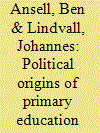

|
|
|
|
|
| Publication |
2013.
|
| Summary/Abstract |
This paper is concerned with the development of national primary education regimes in Europe, North America, Latin America, Oceania, and Japan between 1870 and 1939. We examine why school systems varied between countries and over time, concentrating on three institutional dimensions: centralization, secularization, and subsidization. There were two paths to centralization: through liberal and social democratic governments in democracies, or through fascist and conservative parties in autocracies. We find that the secularization of public school systems can be explained by path-dependent state-church relationships (countries with established national churches were less likely to have secularized education systems) but also by partisan politics. Finally, we find that the provision of public funding to private providers of education, especially to private religious schools, can be seen as a solution to religious conflict, since such institutions were most common in countries where Catholicism was a significant but not entirely dominant religion.
|
|
|
|
|
|
|
|
|
|
|
|
|
|
|
|
| 12 |
ID:
171098
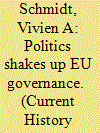

|
|
|
|
|
| Summary/Abstract |
EU governance, which was long apolitical and technocratic, with disagreements handled in private and deals made behind closed doors, has become more politically charged.
|
|
|
|
|
|
|
|
|
|
|
|
|
|
|
|
| 13 |
ID:
074556


|
|
|
|
|
| Publication |
2006.
|
| Summary/Abstract |
The power resources approach, underlining the relevance of socioeconomic class and partisan politics in distributive conflict within capitalist economies, is challenged by employer-centered approaches claiming employers and cross-class alliances to have been crucial in advancing the development of welfare states and varieties of capitalism. Theoretically and empirically these claims are problematic. In welfare state expansion, employers have often been antagonists, under specific conditions consenters, but very rarely protagonists. Well-developed welfare states and coordinated market economies have emerged in countries with strong left parties in long-term cabinet participation or in countries with state corporatist institutional traditions and confessional parties in intensive competition with left parties.
|
|
|
|
|
|
|
|
|
|
|
|
|
|
|
|
|
|
|
|
|